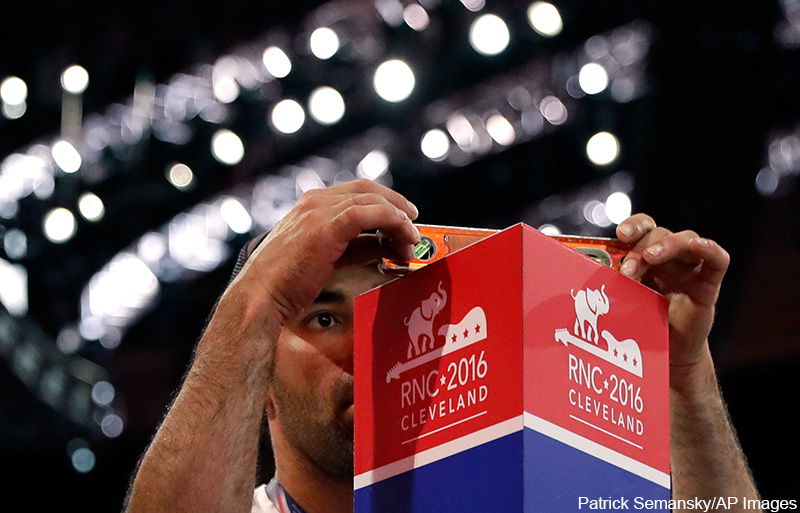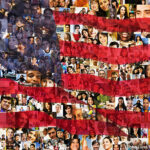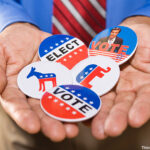Hot News
- Current Events Nebraska Rejects Winner-Take-All Proposal
- Citizenship Voting Under Age 18
- Citizenship Citizenship in Action
- Democratic Party Biden’s and Trump’s Recent Primary Results
- Elections Trump and Biden Win South Carolina and Michigan Primaries
- Democratic Party Trump and Biden Win Big in Early February Contests

Credit: Patrick Semansky/AP Images.
Preparing for the Republican National Convention inside Quicken Loans Arena in Cleveland, Ohio,
First Days of the GOP Convention
Republicans are gathering this week in Cleveland for its much-anticipated national convention. As much of the party-specific things begin to wrap up and everyone prepares for Donald Trump’s big acceptance speech on Thursday night, here is part one of a two-part series on what happened and what to make of it.
Highlights
- Missing Notables Four of the five men who have most recently held the GOP nomination are absent from the convention. This includes Bush Sr. and Jr., John McCain, and Mitt Romney. Former Senator Bob Dole (the party’s nominee in 1996) is the only one represented. Likewise, some of Trump’s primary rivals—Senator Marco Rubio, Senator Lindsey Graham, Jeb Bush, and Governor John Kasich—also opted out. (Kasich’s absence is especially glaring because the convention is being held in his home state of Ohio.) Several of the country’s most prominent Republican governors—including South Carolina’s Nikki Haley and Charlie Baker of Massachusetts, as well as 21 Republican senators, are not in attendance.
- #NeverTrump Fails Back in April, Election Central posed the possibility of a “contested convention” if Trump failed to achieve enough delegates to secure the nomination outright. Despite the fact that the billionaire managed to reach the required number of votes, many wondered what actions the delegates might take to attempt to ultimately block the nomination. On the first night of the convention, some of the attending party delegates attempted to force a vote on changing a rule that would allow the delegates to be “unbound,” allowing them to vote for whomever they wished. They were ultimately unsuccessful in blocking the nomination. (Here is a more detailed account of the process.)
- Speakers and Their Speeches For a rising-star politician, being selected as a convention speaker is considered a great opportunity for advancement. (For instance, most of the country first heard of Barack Obama because of his speech at the Democratic Party Convention in 2004). The opportunity should have been a stellar one for Joni Ernst. Instead, the popular Senator from Iowa addressed a mostly empty room, as the day had run long and the prime-time coverage was over. Speaker of the House Paul Ryan and New Jersey governor Chris Christie spoke on Tuesday. Celebrity speakers included 1970s television actor, Scott Baio and former soap opera and reality star, Antonio Sabatto, Jr. Members of Trump’s family, including his wife (whose speech, some felt, closely copied Michelle Obama’s 2008 convention speech) and two of his children addressed the crowd. Former New York governor, Rudy Giuliani gave perhaps the most rousing speech, one that addressed racial divides in the country.
- Peaceful Cleveland As expected, protesters and supporters are gathering outside of the convention and around Cleveland. So far, however, there have been no reported major incidents of violence or unrest. Police presence is heightened in the downtown, with law enforcement from neighboring states lending a hand. The fact that Ohio has “open carry” gun laws has made a few people nervous, but at the end of the first day, the mayor’s office confirmed that there were no arrests directly related to the protests. At the end of the second day, a trio of women were arrested for criminal mischief for attempting to hang a banner on a flagpole.


